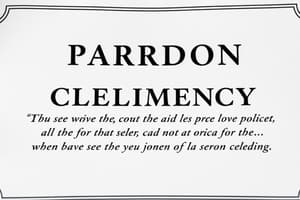Podcast
Questions and Answers
What is the difference between absolute and conditional pardon?
What is the difference between absolute and conditional pardon?
- Absolute pardon has conditions attached to it, while conditional pardon has no conditions attached to it.
- Absolute pardon and conditional pardon are the same thing.
- Absolute pardon and conditional pardon are both granted before trial.
- Absolute pardon has no conditions attached to it, while conditional pardon has conditions attached to it. (correct)
How does amnesty differ from pardon?
How does amnesty differ from pardon?
- Pardon is exercised before trial or investigation, while amnesty is exercised when the person is already convicted.
- Amnesty is exercised individually by the president, while pardon is a blanket pardon to classes of persons or community who may be guilty of political offenses.
- Pardon looks backward and abolishes the crime itself, while amnesty looks forward and forgives the punishment. (correct)
- Amnesty is a private act of the president that must be pleaded and proved by the person, while pardon is a proclamation by the chief executive with concurrence of the congress.
What is the main difference between amnesty and pardon in terms of who it applies to?
What is the main difference between amnesty and pardon in terms of who it applies to?
- Amnesty applies before trial or investigation, while pardon applies after the person is already convicted.
- Pardon applies to individuals, while amnesty applies to classes of persons or community. (correct)
- Pardon applies to classes of persons or community, while amnesty applies only to individuals.
- Amnesty applies to any crime, while pardon applies only to political offenses.
Flashcards are hidden until you start studying
Study Notes
Pardon vs. Amnesty
- Absolute Pardon: A complete forgiveness of a crime, erasing theconviction from the individual's record, and removing all penalties and disabilities associated with the conviction.
- Conditional Pardon: A pardon granted with certain conditions, such as good behavior, that must be met to avoid revocation of the pardon.
Amnesty vs. Pardon
- Pardon: A act of forgiveness granted to an individual, usually by a government or head of state, for a specific crime or set of crimes.
- Amnesty: A blanket forgiveness granted to a group of people, usually for a specific type of crime or set of crimes, and is often granted to a large number of people at once.
Key Difference: Who it Applies to
- Pardon: Applies to a single individual, granting them forgiveness for a specific crime or set of crimes.
- Amnesty: Applies to a group of people, often a large number, and is typically granted to those who have committed a specific type of crime or set of crimes.
Studying That Suits You
Use AI to generate personalized quizzes and flashcards to suit your learning preferences.




